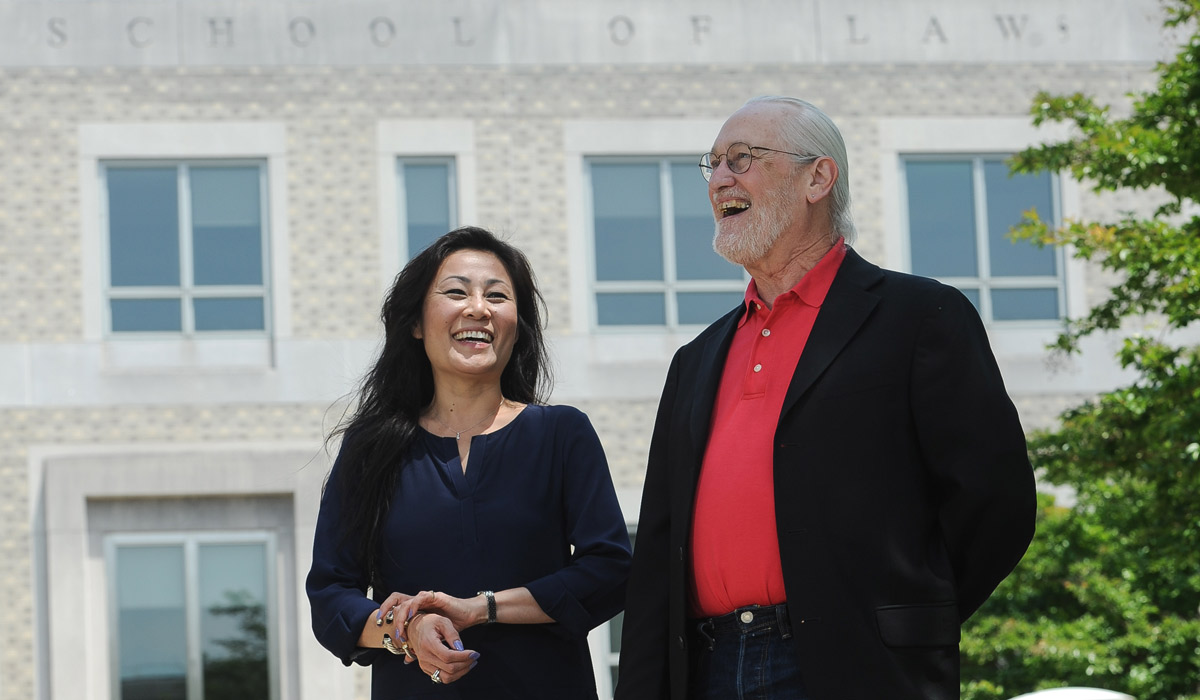

On a Friday afternoon last December, Sandy Ogilvy, professor in the Columbus School of Law, received a call from the United States Office of the Pardon Attorney. The news was good.
Ogilvy learned that within hours President Barack Obama would announce that he was commuting the sentences of 95 federal prisoners. Two of them were men represented by Ogilvy and his students working through the law school’s clemency clinic. The administration official wanted the law professor to have the chance to tell the two inmates himself before the news broke publicly.
Acting quickly, Ogilvy placed a call to Talladega Federal Correctional Institution. Within minutes, Sherman Chester and Kevin McDonald, both serving life sentences without parole for nonviolent drug offenses, were brought to the phone.
“That had to be one of the greatest moments in my law career,” says Ogilvy.
After the call, he began spreading the word to his students and colleagues. One of the first emails went to Hyun Jin Kim, J.D. 2015, who as a student prepared Chester’s petition. “I was so happy I started calling my family and friends,” says Kim, now a prosecutor in Florida.
"Through our work in the clinic we get to know our clients. And through that personal interaction, they become more than their crime."
“Sherman is so deserving of clemency. He had served more than 20 years in prison for a non-violent drug offense; an insane sentence when you consider that convicted murderers can get less time. He has more than paid his debt to society,” says Kim.
“Through our work in the clinic we get to know our clients. And through that personal interaction, they become more than their crime.”
Ogilvy, who oversees the law school’s social justice initiatives, has been director of the Innocence Project Clinic since 2006. In 2014, the Clemency Project was added to the clinic through a partnership with former Maryland Gov. Robert L. Ehrlich Jr. During his time as the state’s chief executive, Ehrlich exercised the executive powers of pardon and commutation “in a merciful, responsible way,” says Ogilvy.
Criminal justice reform has become one of few bipartisan issues getting attention in the U.S. Congress. Currently, 2.2 million people are behind bars in the United States. The war on drugs launched in the 1980s largely to address the violence spawned by the crack cocaine epidemic had led to overly harsh sentences and mass incarceration. Mandatory minimums and three-strikes rules left judges bound by law to issue life sentences to thousands of low-level nonviolent drug offenders.
In 2014, the Department of Justice announced a major initiative as part of its “Smart on Crime” plan allowing certain federal inmates to apply for clemency. Among the criteria for applying, prisoners had to have served at least 10 years of their sentence and would likely have received a substantially lower sentence if convicted under current sentencing guidelines for the same offense.
Catholic University's Clemency Project stepped up, taking on several clemency petitions.
“It’s been an amazing time to be a law student working in our clemency clinic and to be in Washington, D.C., during these historic justice reform efforts,” says third-year law student Bridget Byrne. “As a student and as a future attorney, it’s exciting to be part of the discussion and the push for reform.”
For his law clinic’s clients, Ogilvy says just knowing that the students won’t give up can give the inmates reason to keep going every day. “Our students treat them with respect and compassion, and offer them hope,” he says.
This story was adapted from a full-length feature article on the Innocence Project Clinic and Clemency Project that appeared in the summer 2016 issue of The Catholic University of America Magazine.
Related stories:
> Client from Innocence Project Clinic and Clemency Project has Sentence Commuted
> Making the Case for Mercy and Fair Sentencing for Juvenile Offenders